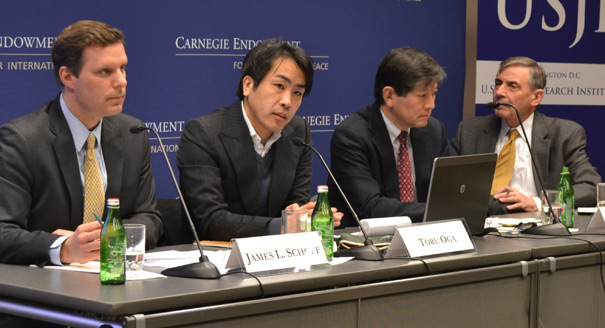Registration
You will receive an email confirming your registration.
The importance of Asia in U.S. foreign policy continues to grow, and so, too, have questions on the future role of the U.S.-Japan alliance in the region. Toru Oga, Mike Mochizuki, and James Przystup joined Carnegie’s James L. Schoff to examine the role of the alliance in the comprehensive security of East Asia. They reviewed related aspects of traditional and nontraditional security studies—human security, economic security, and energy security—and the opportunities for enhanced bilateral policy coordination on these issues in the region.
Discussion Highlights
- The Need for Regionalism: Oga noted that there is a continued need for U.S. military presence to help preserve peace and prosperity in the Asia Pacific region. However, he was careful not to identify this presence as the only path to regional stability and community building. Schoff added that he can foresee scenarios where in some instances the United States is directly involved in building East Asian regionalism as well as instances where it is not.
- Shared Common Values and Interests: Oga concluded that building an Asian Pacific community, as well as an East Asia community, will require the U.S.-Japan alliance to focus on shared common values and interests: freedom, democracy, and human rights. Przystup added that Japan need to focus on becoming a leading promoter of a rule based order, the guardian of the “commons,” such as maritime domain, and on cooperating with other leading democracies.
- Three Communities: Przystup raised the question of how to define “community” in East Asian, arguing that there are actually three: the economic, the diplomatic, and the security community.
-
Economic: Przystup argued that the economic community has been the primary driving force in East Asia, especially a China-centered production-driven community. Mochizuki added that the economic community indeed has been the positive force in East Asian regionalism.
-
Diplomatic: Mochizuki added that Japan has often played the active role in building East Asian regionalism, sometimes against the objection of the United States. Przystup noted that the diplomatic community is far from creating an effective space for each country’s leaders to come together and solve problems.
-
Security: Przystup claimed that this is weakest of the three communities, given continued territorial disputes and other disparate interests. Mochizuki observed that the faltering state of the security community continues despite a relatively good economic relationship. He questioned the sustainability of such economic insulation.
-
This event was co-sponsored by the U.S.-Japan Research Institute.
